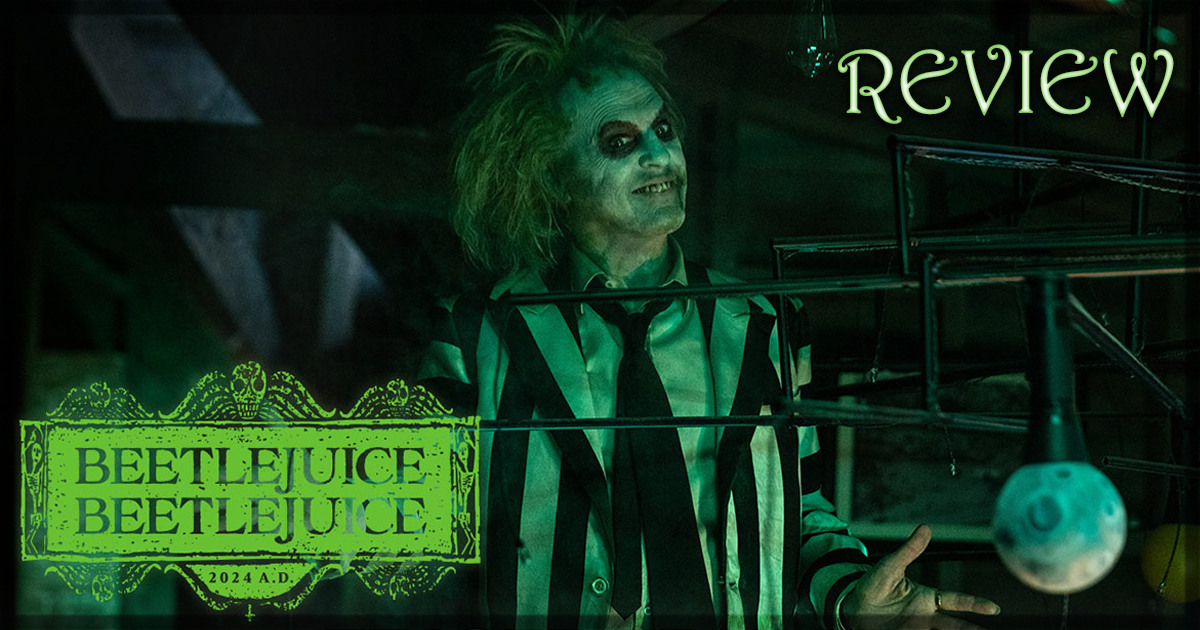Tim Burton’s Beetlejuice Beetlejuice screened out of competition at the 81st Venice International Film Festival on August 28, 2024.
There are few directors in which can truly be accredited with the title of ‘auteur’, but Tim Burton, with his affinity for the macabre, can be called just that. Over a career that currently spans nearly 40 years, he has carefully curated a cinematic style of jet-black panache, one that has become synonymous with gothic iconography. The Burton auteur brand even spreads to films he worked on as producer, with Henry Selick’s The Nightmare Before Christmas often attributed to Burton. Arguably his most iconic work is that of his 1988 sophomore feature Beetlejuice, which put him – and Michael Keaton as the titular character – on the fast track for Hollywood success, moving swiftly onto helming Batman; to even delineate which Batman we are referencing in conversation we say Tim Burton’s Batman.
Beetlejuice followed two ghosts who call on the titular bio-exorcist in an effort to remove the Deetz family that had moved in; Charles (Jeffrey Jones), Lydia (Winona Ryder) and Delia (Catherine O’Hara), but the gooey undead has ulterior motives as he attempts to return to the real world by marrying Lydia. It was a film that emulated the B-movies that Burton grew up with, with a deep love for schlocky, practical effects. It swiftly became a cult classic. Now, 36 years after Beetlejuice found a surprisingly wanting audience, Burton is back for Beetlejuice Beetlejuice, in only his second-ever sequel.
[Editor’s Note: There are spoilers ahead for Beetlejuice Beetlejuice. ]
Beetlejuice Beetlejuice opens in similar fashion to the original: a true-to-life model town shot aerially, ending with the three-story haunted house before cutting to Lydia Deetz (Ryder, reprising the role). 36 years later, Lydia is now a television host, her brief foray with the bureaucratic underworld in the third act of Beetlejuice lending itself to a career as a Ghost Hunter. Her career seems to be going fine until visions of Beetlejuice (Keaton, reprising) begin infiltrating her life with manager turned fiance Rory (Justin Theroux), an all-too-obvious slimeball who weaponizes his supposed feminism.
Unable to explain as to what she is seeing – an off-handed comment is made about Beetlejuice being the only thing that remains unsaid in their relationship – she distracts him and answers the call from her stepmother Delia (O’Hara). Her father, Charles, is dead, and she must return to the town of Winter River for the funeral. Oddly, this barely appears to register with Lydia, but one guesses that with her experience with the dead, she expects not to be apart from him for long.
On their way to Winter River, the family stop off at a boarding school to collect the youngest generation of the ensemble, Astrid (Burton’s newest muse, Jenna Ortega). They return to the haunted house that was once the singular location for Beetlejuice, the home now draped in shrouds of grief, in a literal sense, as contemporary artisté Delia exerts her vision. Catherine O’Hara reprises Delia, but she is more so reprising her Schitt’s Creek character Moira Rose, figuratively speaking. Her performance is less in line with a Burton-esque exaggeration and more so the out-of-work flamboyant actress that exists in that universe.
The family reunion is cut short all too soon, though, as one of many plot threads begins forcibly intruding on the narrative. Of which include a sour romance for Astrid with Jeremy (Arthur Conti), dead actor Wolf Jackson (far and away the best segment, Willem Dafoe) whose long-term role – while alive – in a police franchise offers him a position on the underworld police force.
Then there is the appearance of Beetlejuice’s soul-sucking ex-wife Delores (Monica Belluci) and Beetlejuice’s strangely undefined role as a bureaucrat with a desk along with a long-distance obsession with Lydia, of whom he failed to marry in the original. Not forgetting the appearance of Charles as a headless torso roaming the underworld (Jones, convicted of child pornography, does not reprise the role). This is all to say just how scattershot the entire picture is. These plot threads coalesce in the finale – quite haphazardly – but the woefully underused Delores disappears for too much of the runtime to feel her presence as an antagonist, especially when she cooly arrives on the picture as reanimated body parts, a Frankenstein’s Monster stapling herself back together.
While the script is a goopy fleshbag of unrefined ideas, Burton thankfully goes old-school in many ways; returning composer Danny Elfman’s score is resoundingly pleasant, with motifs from Beetlejuice recurring and there is an abundance of practical effects, with the caveat that some CGI effects (namely a cringe-worthy scene with some influencers) are not as graceful and tactile. We return to the sand dunes where sock puppet stop-motion sandworms roam and receive a hellish visual of a baby Beetlejuice puppet. Some flair is seen in a flashback to Delores and Beetlejuice’s marriage, in which we seem to get lore added about Beetlejuice originally being Italian as the entire scene is shown in Italian.
We explore more of the bureaucratic underworld throughout as the trio of women stars traipse through it, while also getting a chance to visit the town in all its autumnal Halloween glory. There are some other throwbacks, such as Harry Belafonte’s Banana Boat (Day-O) but unlike the recent Alien: Romulus, they never feel quite as obnoxious. The closest the film gets to any egregious level of nostalgia bait (other than its very unnecessary existence) is in its third act, where it tries too hard to replicate the iconic possession scene.
What is particularly noticeable within the film is Burton seemingly attempting to counter arguments made that he doesn’t cast Black people in his movies. In a third-act extension of the underworld, transport named the Soul Train appears – which is mostly populated by dancing Black people – and has worse optics than Burton’s own narrow-minded comments about forced diversity.
The film also seems to be following in the footsteps of its predecessor as the original script for Beetlejuice was deemed too dark and was lightened in tone, while this seems to have experienced similar sanitation as an F-bomb is covered by a very sharp and very unneeded bleep.
Beetlejuice Beetlejuice has Burton’s fingerprints all over it, for better or worse. In the canon of legacy sequels, there are far worse entries that exist than something made with a vigour for practical effects and a desire to entertain.
Beetlejuice Beetlejuice will be in theaters on September 6, 2024.
Learn more about the film, including how to buy tickets, at the official website for the title.
You might also like…
‘The Union’ Review: A Netflix Flick That Proves Forgettable is Worse than Bad


